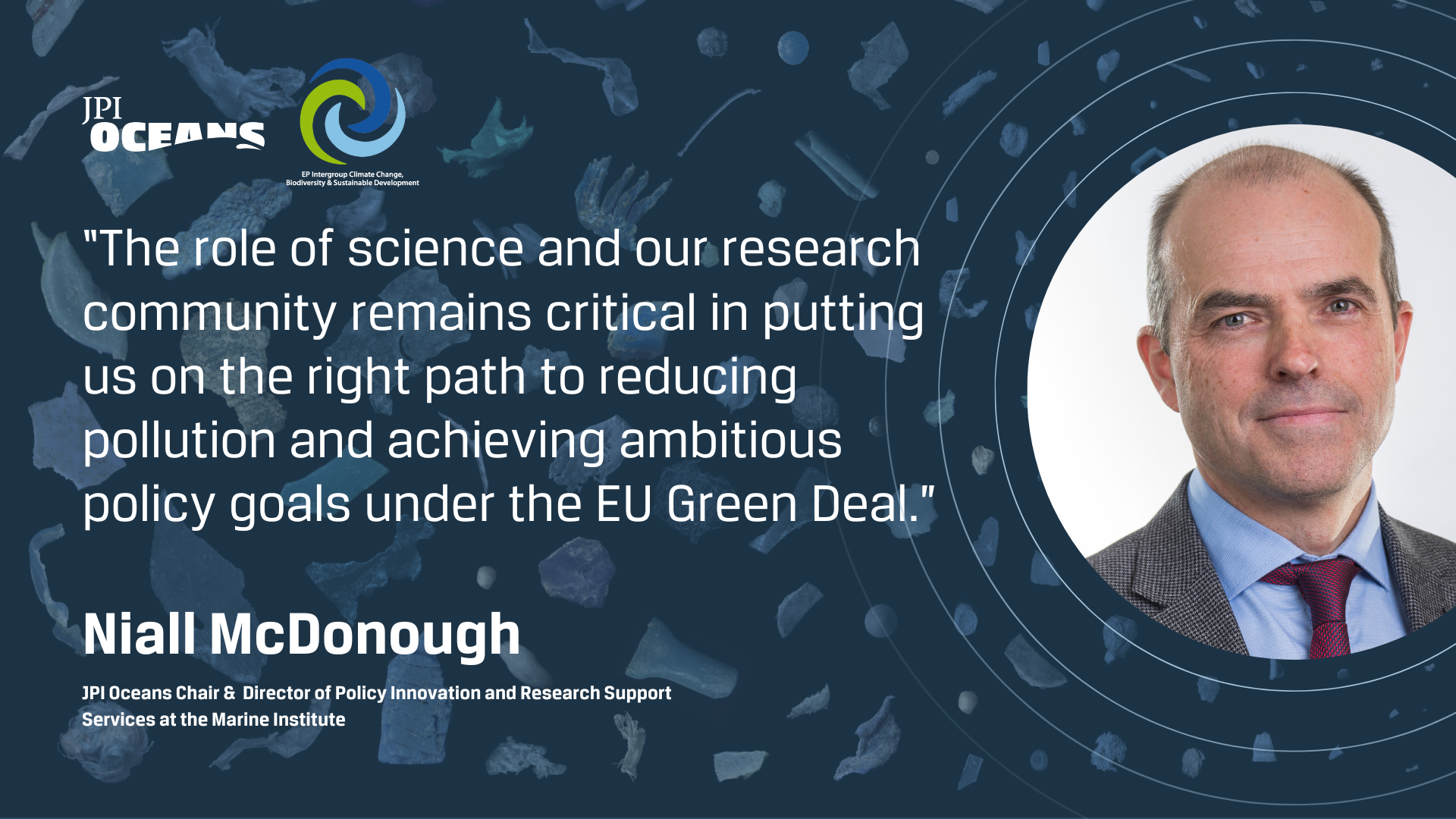19 years ago the first mention of the term microplastics was introduced. 8 million pieces of plastic pollution make their way into the ocean every day (OSPAR, 2009). At this year’s World Environment Day on 5 June, the issue of plastic pollution was front and center under the banner #BeatPlasticPollution. To foster a comprehensive understanding of the challenges posed by microplastics in our marine ecosystems and to catalyse collective action, JPI Oceans together with EP Intergroup Climate Change, Biodiversity & Sustainable Development organised on 6 December 2023 the Parliamentary event entitled “Small particles, big concerns: Marine microplastics revisited.”
Opening the event Dr Niall McDonough, Chair of JPI Oceans, outlined the pioneering role of the initiative in addressing the microplastics issue. Recognising the scale of the problem and the significant knowledge gaps that existed, JPI Oceans established a joint action on marine microplastics 10 years ago. Since 2014, 15 EU Member States and Brazil have pooled €18.2 million in public funding to support 10 research projects. Concluding, Dr McDonough emphasized the importance of mechanisms like JPI Oceans, pooling funding from national research budgets to deliver policy-relevant research and knowledge outputs in support of sustainable and healthy oceans.

Experts highlighted the urgent need for collaborative efforts to tackle the pervasive problem of microplastic pollution. Emphasis was placed on the importance of knowledge transfer and a holistic approach in developing concrete legislative strategies.
"(Microplastics) are dangerous for health, for the environment, and for people’s lives.”
MEP Maria Spyraki
MEP Maria Spyraki urged all companies, large and small, to evolve and adapt to tackle this problem. She concluded with the call for innovation and research, as well as more funding for new technologies.
The event featured insights from the second round of JPI Oceans Joint Action, showcasing six funded projects: ANDROMEDA, HOTMIC, FACTS, MicroplastiX, RESPONSE, i-plastic. Findings underscored the widespread presence of marine microplastics, their diverse sources, and challenges in standardizing methods for identification and measurement.
“The recent JPI Oceans microplastics projects produced a wealth of information and technologies toward understanding the distribution and effects of marine microplastics. These results provide clear guidance on policies to improve the health of the future ocean.”
Aaron Beck, GEOMAR, Coordinator JPI Oceans HOTMIC project
The role of industry in addressing microplastic pollution was discussed. Industry-funded projects were acknowledged for contributing relevant information to adapt production methods. Concerns were raised about the toxicity of additives, particularly in car tires, and the need for transparency in additive mixtures, especially in bio- and compostable plastics.
Experts recommended a precautionary principle, education and knowledge transfer, and the promotion of a circular economy to combat plastic pollution. The importance of reducing the number of polymers and additives was emphasized, along with the need for standardized indicators for monitoring plastic pollution.
Difficulties in measuring unintentional microplastic releases, particularly from geotextiles and tires, were highlighted. The panelists acknowledged the challenges posed by the complexity of defining and assessing biodegradable plastics and emphasized the need for risk assessment and transparency.
The importance of global collaboration, as exemplified by the UNEP's evidence-based approach, was stressed. Experts called for innovative solutions and underscored the role of data-driven policymaking in negotiating a global plastic agreement.
The conference ended with a recognition that while progress has been made, there is still much work to be done. Uncertainty remains about the overall impact of microplastic pollution, and a collective effort is required to address the environmental challenges posed by these persistent pollutants.
MEP Catherine Chabaud concluded by pointing out the progress that has been made on this topic for the last 10 years. She highlighted the presence of a plastic sphere in the world. Therefore, it is necessary that the legislation tackles this issue, not only after it exists, but also to prevent it.
To access the presentations and recording from the meeting, visit this page.